ZeroMQ - goddes4/python-study-wiki GitHub Wiki
특징
- 임베디드 네트워킹 라이브러리 (ActiveMQ or RabbitMQ 같은 메시징 브로커가 존재하지 않음)
- 사용자에 익숙한 Socket Style API로 디자인된 라이브러리
- 메시지 수신이 가능하지 않을 때는 Queuing 될 수 있다 (over-full 큐에 대한 정책은 메시징 패턴에 따라 결정)
- 많은 노력 없이도 복잡한 통신 시스템을 설계할 수 있도록 해주는 메시징 라이브러리
- 분산 또는 동시성 애플리케이션에서 유용하다
- 라우팅이 가능한 메일박스다
- lock-free (lock, semaphores 대기가 필요하지 않음)
- 자동으로 재 연결 시도 (어떤 순서로도 구성요소를 시작 할 수 있음) 언제든지 네트워크에 참여하고 떠날 수 있는 서비스 지향 아키텍처(SOA)를 만들수 있다.
분산 애플리케이션(Distributed Application)은 거대한 하나의 애플리케이션(Monolithic Application) 보다 변화에 대응하기 쉽다.
server 가 bind() 하지 않은 상태에서 client 가 connect() 하고 메시지를 송신하더라도 queuing 후에 처리된다.
(메시지 전송 이후에 close() 하더라도 나중에 서버가 bind() 이후에 데이터가 전달됨,
close() 이후에 데이터 전송을 원하지 않으면 `socket.setsockopt(zmq.LINGER, 0)` 설정)
(connect)(3)PUSH-PULL(1)(bind)
PUSH-1 에서 3번 전송, PUSH-2 에서 3번 전송, 서버 bind() 순으로 진행 할 때 메시지는 PUSH-1, PUSH-2 한번씩 번갈아 처리한다.
(connect)(1)PUSH-PULL(3)(bind)
3개의 PULL 에서 동시에 recv() 대기중인 상태에서 PUSH 에서 전송하게 되면 3중 한개의 PULL만 메시지를 수신한다.
노드간 연결 방식
- 한 프로세스의 두 쓰레드
- 한 시스템의 두 프로세스
- 네트워크상의 두 시스템
Messaging Pattern
- Request-Reply Pattern
- Publish/Subscribe pattern
- Pipeline Pattern
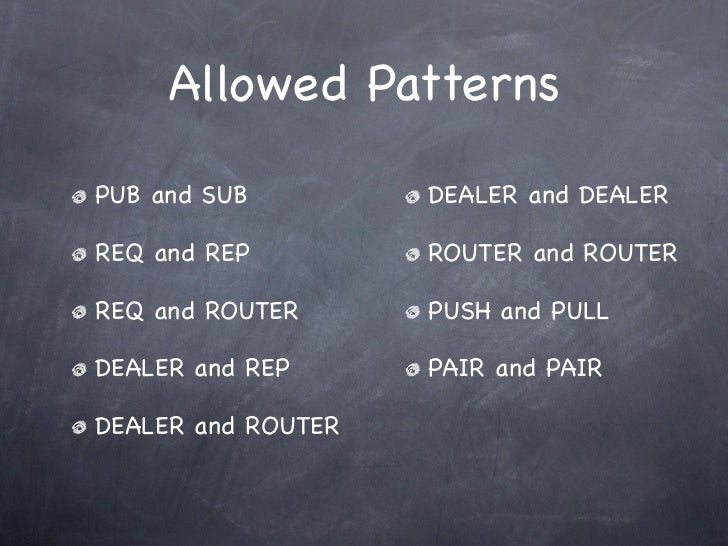
Device
Queue
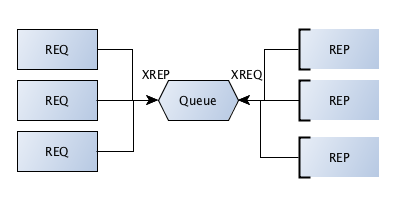
Forwarder
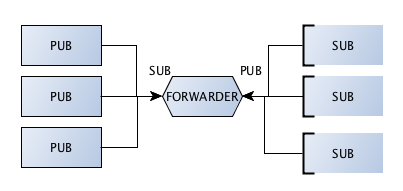
Streamer
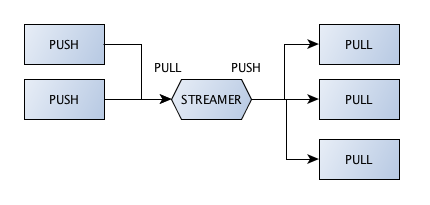
Installation in python
# pip install pyzmq
버전 확인
import zmq
print(zmq.pyzmq_version())
ZeroMQ Context
zmq 라이브러리 기능을 사용하기 전에 먼저 생성 되야 한다.
import zmq
context = zmq.Context()
ZeroMQ Sockets
zmq 소켓은 context 를 통해 생성할 수 있다.
socket = context.socket(zmq.REP)
Example
REQ/REP
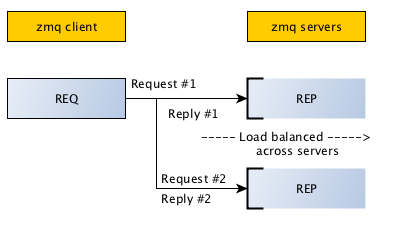
특징
- REQ socket 은 많은 서버에 연결(connect) 할 수 있다.
- REQ 의 send() 는 응답이 올 때 까지 block 된다.
- REP 의 recv() 는 요청이 수신 될 때 까지 block 된다.

Replay
메시지 응답
import zmq
context = zmq.Context()
socket = context.socket(zmq.REP)
socket.bind('tcp://127.0.0.1:10101')
while True:
print('recv : ' + socket.recv_string())
socket.send_string('world')
Request
import zmq
import time
context = zmq.Context()
socket = context.socket(zmq.REQ)
socket.connect('tcp://127.0.0.1:10101')
while True:
socket.send_string('hello')
print('recv : ' + socket.recv_string())
time.sleep(3)
===
Pub/Sub

특징
- PUB socket의 경우 연결된 SUB가 없는 경우 메시지는 버려진다.

SUB 의 경우 반드시 setsockopt() 를 사용하여 subscription 을 설정해야 한다. SUB/PUB 어느곳에서 연결(connect)하든, 바인드(bind) 하든 문제는 되지 않으나, 만약 SUB 소켓을 먼저 바인드(bind) 하고 나중에 PUB 소켓을 연결(connect)하면 SUB 소켓은 오래된 메시지를 받을 수 없게 된다. 그러므로 가능하면 PUB은 바인드(bind), SUB 은 연결(connect) 하는것이 가장 좋다.
Publisher 가 바인딩 후 즉시 메시지를 전송하면, Subscriber 는 데이터를 수신 못할 가능성이 있습니다. 이를 위해서 Subscriber 가 연결하고 준비되기까지 데이터를 발송하지 않도록 동기화 하는 방법을 제공한다.
ØMQ의 PUB-SUB Pattern 특징
- 하나의 Subscriber 는 한 개 이상의 Publisher 에 연결할 수 있다.
- Subscriber 가 없다면 모든 Publisher 의 메시지는 유실 된다.
- Subscriber 에서만 메시지 필터링이 가능하다.
Publisher
3 초에 한번 메시지 전송
import zmq
import time
context = zmq.Context()
socket = context.socket(zmq.PUB)
socket.bind('tcp://127.0.0.1:10100')
while True:
socket.send_string('Hello')
time.sleep(3)
Subscriber
import zmq
context = zmq.Context()
socket = context.socket(zmq.SUB)
socket.connect('tcp://127.0.0.1:10100')
socket.setsockopt_string(zmq.SUBSCRIBE, '') # it will capture all messages
while True:
print(socket.recv_string())
===
PULL/PUSH (Pipeline 패턴)
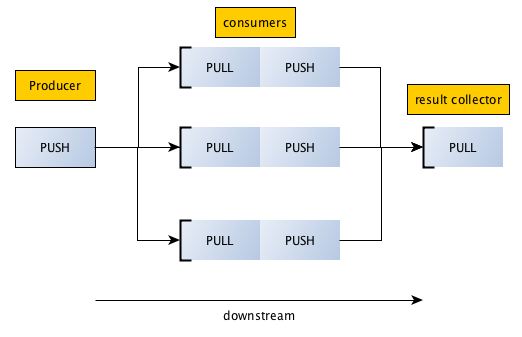
특징
- PUSH socket 은 연결이 존재하지 않을 때 send() 하기 되면 연결 될 때 까지 블록 된다.
- 전달된 메시지는 연결된 socket 에 round robin 된다.

- Worker는 ventilator에 PULL로 연결(connect)되어 있고, sink와는 PUSH로 연결(Connect) 되어 있다. 이것은 Worker 는 임의로 추가 할 수 있다는 것을 의미한다. 만약 worker 가 바인딩(bind) 되어 있다면 worker 가 추가 될 때마다 매번 ventilator와 sink에 더 많은 소켓이 필요하다. 이 구조에서 ventilator와 sink 는 stable part, worker는 dynamic part 라 부른다.
- ventilator의 PUSH 소켓은 균등하게 Worker에 작업을 분배한다. (load-balancing)
- Sink의 PULL 소켓은 균등하게 Worker로 부터 결과를 수집한다. (fair-queuing)
PUSH, PULL의 bind, connect 는 상황에 따라 유용한 패턴이 있다.
- PUSH - bind, PULL - connect 의 경우는 동시 처리를 위한 Producer-Consumer 패턴에 적합
- PUSH - connect, PULL - bind 의 경우 처리 데이터를 한곳으로 집중 시켜 모을 때 좋음
Parallel Pipeline with Kill Signaling

Parallel task ventilator
3 초에 한번 메시지 전송
import zmq
import random
import time
context = zmq.Context()
sender = context.socket(zmq.PUSH)
sender.bind('tcp://127.0.0.1:10102')
sink = context.socket(zmq.PUSH)
sink.connect('tcp://127.0.0.1:10103')
print("Press Enter when the workers are ready: ")
_ = input()
print("Sending tasks to workers")
# The first message is "0" and signals start of batch
sink.send(b'0')
# Initialize random number generator
random.seed()
# Send 100 tasks
total_msec = 0
for task_nbr in range(100):
# Random workload from 1 to 100 msecs
workload = random.randint(1, 100)
total_msec += workload
sender.send_string(u'%i' % workload)
print(i)
print("Total expected cost: %s msec" % total_msec)
# Give 0MQ time to deliver
time.sleep(1)
Parallel task worker
import sys
import time
import zmq
context = zmq.Context()
# Socket to receive messages on
receiver = context.socket(zmq.PULL)
receiver.connect("tcp://localhost:10102")
# Socket to send messages to
sender = context.socket(zmq.PUSH)
sender.connect("tcp://localhost:10103")
# Process tasks forever
while True:
s = receiver.recv()
# Simple progress indicator for the viewer
sys.stdout.write('.')
sys.stdout.flush()
# Do the work
time.sleep(int(s)*0.001)
# Send results to sink
sender.send(b'')
Parallel task sink
import sys
import time
import zmq
context = zmq.Context()
# Socket to receive messages on
receiver = context.socket(zmq.PULL)
receiver.bind("tcp://127.0.0.1:10103")
# Wait for start of batch
s = receiver.recv()
# Start our clock now
tstart = time.time()
# Process 100 confirmations
total_msec = 0
for task_nbr in range(100):
s = receiver.recv()
if task_nbr % 10 == 0:
sys.stdout.write(':')
else:
sys.stdout.write('.')
sys.stdout.flush()
# Calculate and report duration of batch
tend = time.time()
print("Total elapsed time: %d msec" % ((tend-tstart)*1000))
context.term() 을 호출 하기 전에 체크 사항
- 열려있는 소켓이 있다면 Blocking (LINGER : 0 시에도 Blocking)
- 소켓이 Close() 상태더라도 send() 가 처리 되기 전까지 Blocking (LINGER : 0 적용시 예외)
- 즉 데이터 전송이 완료된 이후에 소켓 종료, Context 종료 순으로 진행되어야 함. 데이터 전송과 상관없이 종료 하고 싶으면 LINGER zero 옵션 적용
Handling Multiple Sockets
This version uses a simple recv loop
import zmq
import time
# Prepare our context and sockets
context = zmq.Context()
# Connect to task ventilator
receiver = context.socket(zmq.PULL)
receiver.connect("tcp://localhost:5557")
# Connect to weather server
subscriber = context.socket(zmq.SUB)
subscriber.connect("tcp://localhost:5556")
subscriber.setsockopt(zmq.SUBSCRIBE, b"10001")
# Process messages from both sockets
# We prioritize traffic from the task ventilator
while True:
# Process any waiting tasks
while True:
try:
msg = receiver.recv(zmq.DONTWAIT)
except zmq.Again:
break
# process task
# Process any waiting weather updates
while True:
try:
msg = subscriber.recv(zmq.DONTWAIT)
except zmq.Again:
break
# process weather update
# No activity, so sleep for 1 msec
time.sleep(0.001)
This version uses zmq.Poller()
import zmq
# Prepare our context and sockets
context = zmq.Context()
# Connect to task ventilator
receiver = context.socket(zmq.PULL)
receiver.connect("tcp://localhost:5557")
# Connect to weather server
subscriber = context.socket(zmq.SUB)
subscriber.connect("tcp://localhost:5556")
subscriber.setsockopt(zmq.SUBSCRIBE, b"10001")
# Initialize poll set
poller = zmq.Poller()
poller.register(receiver, zmq.POLLIN)
poller.register(subscriber, zmq.POLLIN)
# Process messages from both sockets
while True:
try:
socks = dict(poller.poll())
except KeyboardInterrupt:
break
if receiver in socks:
message = receiver.recv()
# process task
if subscriber in socks:
message = subscriber.recv()
# process weather update
그밖에 메시지 패턴
Small-Scale Pub-Sub Network

Extended Pub-Sub

Request Distribution

Extended Request-Reply

Pub-Sub Forwarder Proxy

Queue Broker Exameple
Simple request-reply broker
import zmq
# Prepare our context and sockets
context = zmq.Context()
frontend = context.socket(zmq.ROUTER)
backend = context.socket(zmq.DEALER)
frontend.bind("tcp://*:5559")
backend.bind("tcp://*:5560")
# Initialize poll set
poller = zmq.Poller()
poller.register(frontend, zmq.POLLIN)
poller.register(backend, zmq.POLLIN)
# Switch messages between sockets
while True:
socks = dict(poller.poll())
if socks.get(frontend) == zmq.POLLIN:
message = frontend.recv_multipart()
backend.send_multipart(message)
if socks.get(backend) == zmq.POLLIN:
message = backend.recv_multipart()
frontend.send_multipart(message)
Same as request-reply broker but using zmq.proxy
import zmq
def main():
""" main method """
context = zmq.Context()
# Socket facing clients
frontend = context.socket(zmq.ROUTER)
frontend.bind("tcp://*:5559")
# Socket facing services
backend = context.socket(zmq.DEALER)
backend.bind("tcp://*:5560")
zmq.proxy(frontend, backend)
# We never get here…
frontend.close()
backend.close()
context.term()
if __name__ == "__main__":
main()
Missing Message Problem Solver
